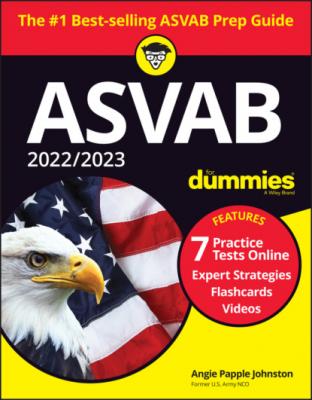2022 / 2023 ASVAB For Dummies. Angie Papple Johnston
Читать онлайн.| Название | 2022 / 2023 ASVAB For Dummies |
|---|---|
| Автор произведения | Angie Papple Johnston |
| Жанр | Учебная литература |
| Серия | |
| Издательство | Учебная литература |
| Год выпуска | 0 |
| isbn | 9781119870197 |
The school district has a budget crunch because the state has a budget crunch. The state cut funding to the school district. Some teachers have been laid off already. More may be laid off soon.
Now, if you wrote something like, “It’s finally May, and shoppers and kids-at-play are out and about, enjoying the warmer temperatures of spring,” then you’re not paying attention.
Extra, extra! Identifying subpoints
If a writer stuck to just one point, the Paragraph Comprehension subtest would be a breeze. However, an author usually doesn’t make just one point in a piece of writing, so you also need to understand the other points the author makes. These details, or subpoints, may include facts or statistics, or they may be descriptions that support the main point of the passage. Subpoints help you see what the author’s saying. For instance, look at this passage (from the preceding section):
The local school district is facing a serious budgetary crisis. The state, suffering a revenue shortfall of more than $600 million, has cut funding to the district by $18.7 million. Already, 65 teachers have been laid off, and more layoffs are expected.
The subpoints help you understand the main point, which is that the school district is facing a severe budgetary crisis. The subpoints help you understand why: “The state, suffering a revenue shortfall of more than $600 million, has cut funding to the district by $18.7 million.” You can see that the budgetary crisis is part of a larger problem, which is the state is suffering a severe revenue shortfall. The subpoints also help you understand what this crisis means: “Already, 65 teachers have been laid off, and more layoffs are expected.” By using these facts and figures, the author helps you grasp not only the main point but also the implications of that main point.
Analyzing What You’ve Read: Guessing at What the Writer Really Means
The Paragraph Comprehension subtest of the ASVAB also requires you to analyze what you’ve read. Analysis is more than simply picking out the point of the text. Analyzing a passage requires you to draw conclusions from what you’ve read and understand relationships among the ideas presented in the text.
By drawing conclusions about the meaning of a passage, you reach new ideas that the author implies but doesn’t come right out and state. You must analyze the information the author presents in order to make inferences from what you’ve read. For instance, look at the following paragraph:
The local school district is facing a serious budgetary crisis. The state, suffering a revenue shortfall of more than $600 million, has cut funding to the district by $18.7 million. Already, 65 teachers have been laid off, and more layoffs are expected.
Although the author doesn’t say so, you can draw the conclusion that if the state revenue shortfall could somehow be corrected — by increasing state sales tax, for example — the local school district’s budgetary crisis could be resolved. The $18.7 million cut from the school budget could be restored. The author never actually makes this point in the paragraph, but by using logic, you can draw this conclusion from the facts presented.
Look at the next paragraph:
The farmers’ market reopened on the second weekend of May. Amid the asparagus and flowers, shoppers chatted about the return of temperatures in the 70s. Across the street, children (and their dogs) played Frisbee in the park. Finally, spring has come to town.
Suppose you’re asked the following question about this paragraph:
(A) Frisbee playing in the park doesn’t happen in winter.
(B) the warm weather is unusual for this time of year.
(C) the shoppers were disappointed in the farmers’ market produce.
(D) rain is imminent.
If the point of the passage is that spring has come to town and the author uses Frisbee playing as evidence of the arrival of spring, then it’s likely that Frisbee playing doesn’t occur in the winter but does begin again in spring. The answer is Choice (A).
Faster than a Speeding Turtle: Tips for Slow Readers
For many people, 13 to 27 minutes is enough time to read all the passages, understand the questions, and choose the correct answers. But slow readers may have more difficulty answering all the questions before time is up. Don’t despair: Take the suggestions in this section to help build your reading speed. Of course, they require work, but you knew the mission came with its challenges, right?
Read more, watch less
If you’re a slow reader, chances are you don’t do a lot of reading. If you have plenty of time before you’re due to take the ASVAB, start reading more — right now. It’s in your best interest.
Become a lean, mean word machine
People sometimes read slowly because they don’t have a large vocabulary and don’t understand everything they read. If you can identify with this situation, improving your vocabulary is your first step toward increasing your reading comprehension and your reading speed. (Chapter 4 gives you info on building your word knowledge. Check it out.)
